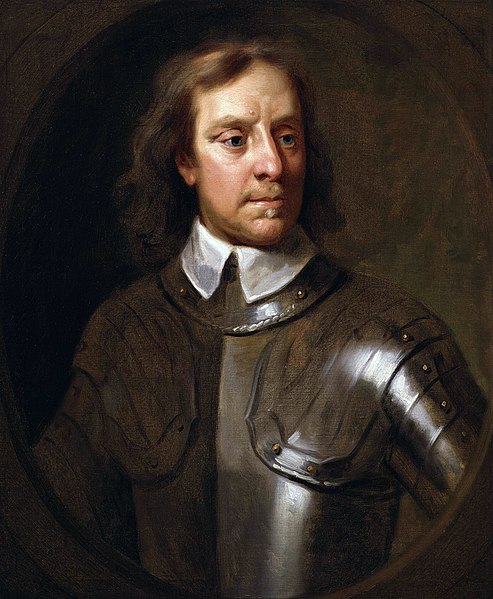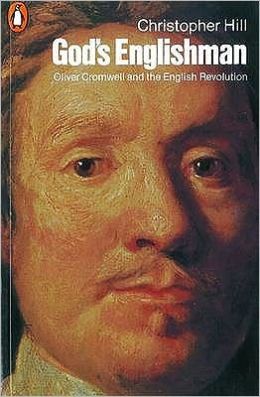I just finished reading God's Englishman: Oliver Cromwell and the English Revolution by Christopher Hill. When the book was published (in 1970), the author was perhaps the foremost interpreter of 17th century English history. In this book he describes that century as the decisive one in English history, a century in which the Middle Ages ended. By the end of the century England, alone among the nations of the world, was read to enter the modern age.
Hill sees massive and interrelated economic, political and social changes taking place over the course of the century. Today we try to understand these changes in terms of underlying social and economic forces. I think Hill would find our very search for natural causes to be an outcome of the evolution in the 17th century. For Cromwell and many of his contemporaries, the patterns of history were divine providence, the working out of God's plan through the action of his chosen people. Cromwell, like many of his followers, felt himself to be one of those chosen people, blessed by God's grace, destined to an eternity in Paradise -- a status denied to the great majority of mankind. Hill describes that view of a providential future achieved by the action of men as itself different from the passivity of the Middle Ages.
Cromwell could not always predict accurately what changes would occur in England, nor where they would lead. Yet he understood himself as an agent of those changes. His Puritan faith gave him confidence that history was the working of God's will; he also is portrayed as believing that he could often predict the direction of providence and act in support of that direction.
The 17th century saw the Stuarts replace the Tudors, the English Civil War, the execution of Charles I, the Restoration of the Stuart monarchy, and the Glorious Revolution. Oliver Cromwell rose from relatively obscure part of the gentry to parliamentarian, general, and eventually Protector in the first 3/5th of the century.
Some Preparatory Facts
1492 marked a turning point in world history with the discovery of America and the expulsion of the Moors from Spain. The 16th century saw the Spanish conquest of what has become Hispanic America as well as the further development of European trade with Asia and knowledge of the African coasts; gold and silver would flood into Europe and Asia leading to radical economic change. The Reformation progressed through much of northern Europe, driving expansion of literacy and promoting individual study of religion, leading also to religious wars.
The 16th century was also that of Tudor England, with the establishment of the Church of England headed by the King. The War of the Roses was past, the nobility had been disarmed, and the Spanish threat was diminished by the destruction of the Armada.
Research published long after Hill's book has shown "show that cooling from A.D. 1560–1660 caused successive agro-ecological, socioeconomic, and demographic catastrophes, leading to the General Crisis of the Seventeenth Century.......that climate change was the ultimate cause, and climate-driven economic downturn was the direct cause, of large-scale human crises in preindustrial Europe."
Demographers and historians have shown that:
By 1530 the population of England and Wales had risen to around 3 million and by 1600 it was about 4 million. In Tudor times towns remained small (although they were a vital part of the economy). The only exception was London. From a population of only about 60,000 or 70,000 at the end of the 15th century it grew to about 250,000 people by 1600. Other towns in Britain were much smaller. The next largest town was probably Bristol, with a population of only around 20,000 in 1600.
Nevertheless in the 16th century towns grew larger as trade and commerce grew. The rise in town's populations was despite outbreaks of plague. It struck all the towns at intervals in the 16th and 17th century but seems to have died out after 1665. Each time it struck a significant part of the town's population died but they were soon replaced by people from the countryside.
At the end of the 17th century it was estimated the population of England and Wales was about 5 1/2 million. The population of Scotland was about 1 million. The population of London was about 600,000.A Modern View of the Changes Occurring During Cromwell's Lifetime
Military: The New Model Army was created to support the Parliamentary cause in the Civil War. It was a professional, standing army rather than an army composed of militias such as that which preceded it and that which served the royalist cause. The New Model Army was national as opposed to the local militias. It promoted officers by merit rather than aristocratic rank (Cromwell sought a man for the office rather than an office for the man). It was relatively well trained for the time. Its soldiers were often motivated by faith that they were serving an important religious cause.
Territory: The Civil War was concluded, England and Wales pacified, the revolt in Ireland put down and Scotland conquered. The British Isles became a single nation, and the threat of "cantonization" ended.
Economic: New lands were brought into agricultural production, notably by draining fens and cutting forests (by the end of the century, England was not only able to feed its increasingly urban population but to export grains). Enclosures, which had begun in the 16th century, were continued. Trade was expanded and national policy increasingly favored trade expansion from late in Cromwell's lifetime. So too was the role of artisans and craftsmen. There were significant redistributions of property favoring the Protestant gentry.
Political: Power of the monarch was greatly reduced and that of the Parliament was increased. Government administration was improved. The gentry gained greatly in power as they dominated the House of Commons and the power of the House of Lords was reduced. The gentry gained local legal and administrative control. Efforts by the commoners (people without property) to obtain power were successfully put down. Many of the judicial institutions created by the monarchy were abolished, leaving those under control of the Parliament in place.
Religious: The Church of England endured but the religious power of the monarch and that of the bishops much reduced, and that of the gentry increased. The local gentry wound up with control of the appointment of ministers paid by tithes. Toleration of individual conscience was increased.
Note however that increasing agricultural production in the lands held by the gentry, increasing their control of their local churches (and the tithes), and making them justices of the peace was not incidental to their increasing political influence.
Cromwell
Check out the Oliver Cromwell timeline.
Oliver Cromwell was born in the lesser branch of a wealthy and locally important family. Political, he was early elected to Parliament, and gained early influence within the legislature. He recruited troops for the Civil War in the 1640s, gained fame for early victories in the Civil War and rose to the highest rank in the New Model Army. After the royalists had been defeated in England he led an invasion of Ireland which quickly and brutally suppressed the rebellion that had been going on there for a decade. He then led forces defeating a Scottish army. With military backing he saw a cleansing of the Parliament of opposing members, and he eventually served as Protector. Two years after his death in 1658 his body was disinterred and hanged.
Hall in his final chapter shows how radically Cromwell's depiction has changed over time; it varied according both to the spirit of the age and the political persuasion of the observer. Some aspects of his biography seem clear. He was a Puritan and his behavior was profoundly influenced by his religious belief. He was pragmatic, and not one who based action on theory. When convinced that Divine Providence was moving in a direction, he would act to support its advance even if that action contradicted philosophical positions he had previously espoused. He was sometimes manic and other times seriously depressed. He was relatively tolerant, but also a man of his time feeling that monarchy was a desired form of government, in favor of democracy but a democracy with suffrage restricted to men of property, supportive of freedom of conscience and the welfare of the common people. Cromwell led in the development of a strong foreign policy, built on naval strength and supportive of the expansion of British trade.
Hall devotes a chapter to Cromwell's religious belief. It is a hard belief for me to understand. It is based on the omnipotence and omniscience of God. Following that, he believed that God must always know who would go to heaven and who would be condemned to death, and thus that there would be a class of people predestined to go to heaven and another class predestined to hell. The chosen people would be those who achieved God's plan for mankind through their actions and God's grace; their actions while predetermined were also their responsibility. Often success would mark their devotion to the right path, but it would be the devotion to the right that was important. Man would not fully understand the divine strategy, but could sometimes perceive its direction especially through the study of history (in terms not only of events but of the trends by imputing divine causality). His was a belief shared at least generally by many Englishmen of his time and they seeing themselves as God's chosen people, able to do great things by God's grace, would feel a great solidarity.
Hall describes this as a change from earlier beliefs which tended to assume that God acted through the agency of kings who ruled by divine right (and I presume prior to the Reformation through the Pope, cardinals and bishops of the Catholic church). Hill also notes that the evolution of Protestant thought in the 17th century also contributed to the development of science as people sought to understand the natural world and through that understanding better exploit its properties; it was in the 17th century that the Royal Academy was founded and Cromwell and his colleagues promoted mathematics and education.
Appreciation for the Book
I found the book quite challenging. Of course I am a Yank; had I been subject to years of British history as any English schoolchild would be, I would have better understood the references in Hall's essays. I say that because the book is perhaps best appreciated as a set of ten related essays, each corresponding to one chapter. However, I found the book enormously thought provoking. I learned a great deal about the 17th century history of England, in part stimulated to use Wikipedia by things I didn't understand in Hall's book.
I must say that I think we still find the course of history hard to predict. Those who most influence the course of history often don't know the effect that their actions will have. Yet we are often more confident than our ignorance and powerlessness would indicate.
I think I would feel that way even if we were not headed for the fiscal cliff, likely to fall off this Friday.
 |
| Oliver Cromwell, by Samuel Cooper |


1 comment:
Thinking more about this book, it occurs to me that it seems to imply more credit for the transformation of British society to Cromwell and the Civil War than seems reasonable to me. There were the little ice age, the Renaissance, the Reformation, the Colombian Exchange, and the opening of intercontinental trade, not to mention printing and literacy -- huge trends that deeply affected British society.
Post a Comment